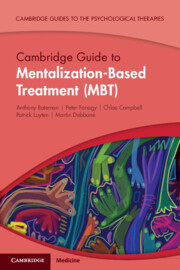Book contents
- Cambridge Guide to Mentalization-Based Treatment (MBT)
- Cambridge Guides to the Psychological Therapies
- Reviews
- Cambridge Guide to Mentalization-Based Treatment (MBT)
- Copyright page
- Contents
- Preface
- A Note from the Series Editor
- Acknowledgments
- Part I Overview of the Model
- Part II The Mentalization-Based Treatment Model in Practice
- Part III Application and Adaptations for Mental Health Presentations
- Part IV Application of Mentalization-Based Treatment in Different Populations and in Different Settings
- Chapter 13 Working with Children
- Chapter 14 Working with Adolescents
- Chapter 15 Working with Families
- Chapter 16 Working with Couples
- Chapter 17 Mentalizing in Other Settings
- Chapter 18 Mentalizing and Emergency Care
- Index
- References
Chapter 17 - Mentalizing in Other Settings
from Part IV - Application of Mentalization-Based Treatment in Different Populations and in Different Settings
Published online by Cambridge University Press: 18 May 2023
- Cambridge Guide to Mentalization-Based Treatment (MBT)
- Cambridge Guides to the Psychological Therapies
- Reviews
- Cambridge Guide to Mentalization-Based Treatment (MBT)
- Copyright page
- Contents
- Preface
- A Note from the Series Editor
- Acknowledgments
- Part I Overview of the Model
- Part II The Mentalization-Based Treatment Model in Practice
- Part III Application and Adaptations for Mental Health Presentations
- Part IV Application of Mentalization-Based Treatment in Different Populations and in Different Settings
- Chapter 13 Working with Children
- Chapter 14 Working with Adolescents
- Chapter 15 Working with Families
- Chapter 16 Working with Couples
- Chapter 17 Mentalizing in Other Settings
- Chapter 18 Mentalizing and Emergency Care
- Index
- References
Summary
This chapter outlines the use of mentalizing as an essential process for unifying teams and creating a caring environment in relation to schools, fostering of children, and caring for babies in adverse circumstances. An individual’s mentalizing is strongly influenced by their social environment. Any intervention that aims to treat a person with mental health problems must take into consideration that person’s social milieu and the context of their treatment. This chapter discusses how to create a mentalizing milieu. In particular it describes the four quadrants of Adaptive Mentalization-Based Integrative Treatment (AMBIT), a relatively new approach that focuses on creating a mentalizing team, and it outlines Creating a Peaceful School Learning Environment (CAPSLE), a program that facilitates the development of a mentalizing environment in order to reduce bullying and aggression and improve learning in schools.
Keywords
- Type
- Chapter
- Information
- Cambridge Guide to Mentalization-Based Treatment (MBT) , pp. 353 - 363Publisher: Cambridge University PressPrint publication year: 2023

